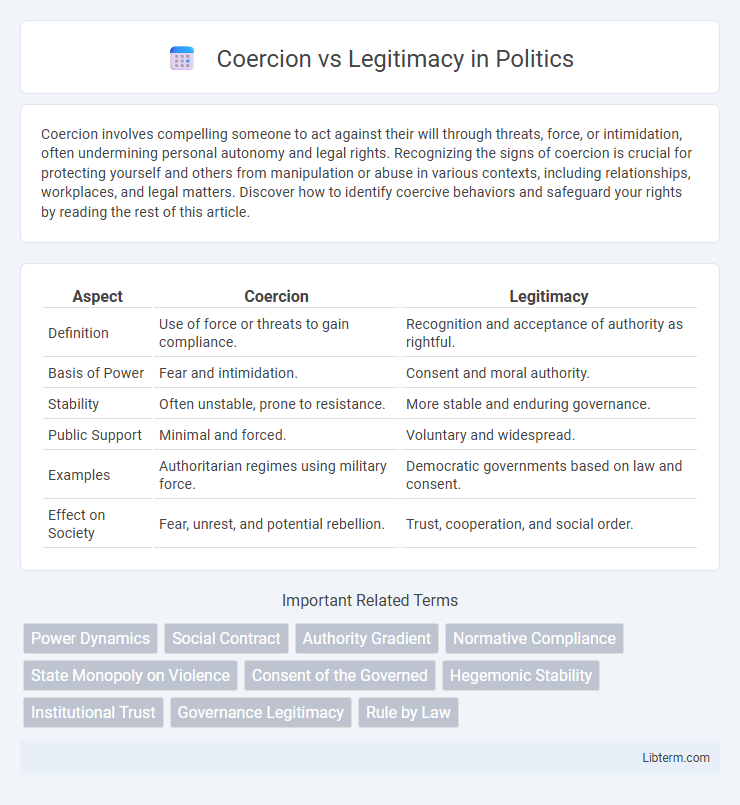Coercion involves compelling someone to act against their will through threats, force, or intimidation, often undermining personal autonomy and legal rights. Recognizing the signs of coercion is crucial for protecting yourself and others from manipulation or abuse in various contexts, including relationships, workplaces, and legal matters. Discover how to identify coercive behaviors and safeguard your rights by reading the rest of this article.
Table of Comparison
| Aspect | Coercion | Legitimacy |
|---|---|---|
| Definition | Use of force or threats to gain compliance. | Recognition and acceptance of authority as rightful. |
| Basis of Power | Fear and intimidation. | Consent and moral authority. |
| Stability | Often unstable, prone to resistance. | More stable and enduring governance. |
| Public Support | Minimal and forced. | Voluntary and widespread. |
| Examples | Authoritarian regimes using military force. | Democratic governments based on law and consent. |
| Effect on Society | Fear, unrest, and potential rebellion. | Trust, cooperation, and social order. |
Understanding Coercion and Legitimacy
Coercion involves the use of force or threats to influence behavior, often resulting in compliance through fear or pressure, whereas legitimacy derives from recognized authority and voluntary acceptance by individuals or groups. Understanding coercion requires analyzing power dynamics that compel actions without consent, while legitimacy emphasizes the moral or legal justification that secures obedience through trust and belief in authority. The distinction between coercion and legitimacy lies in the source of authority: coercion depends on external imposition, while legitimacy depends on internal acceptance.
Historical Perspectives on Authority
Historical perspectives on authority reveal a complex interplay between coercion and legitimacy in establishing power. Ancient regimes often relied on coercion through military force or intimidation, while evolving political theories emphasized the importance of legitimacy derived from consent, legal frameworks, and moral justification. The transition from absolute monarchies to constitutional states exemplifies the shift towards legitimized authority grounded in social contracts and institutionalized governance.
Theoretical Foundations: Power and Consent
Coercion relies on the exercise of power through force or threats, undermining voluntary compliance, while legitimacy is grounded in the consent of the governed, enabling authority to be accepted as rightful. Theoretical foundations in political philosophy emphasize that power without consent risks instability, whereas legitimacy ensures sustainable governance by securing moral and normative justification. Key theorists like Max Weber distinguish coercive power from legitimate authority, highlighting consent as essential to the durability of political institutions.
Coercion: Mechanisms and Implications
Coercion involves the use of force or threats to influence behavior, often resulting in compliance through fear rather than genuine consent. Mechanisms of coercion include physical violence, legal penalties, economic sanctions, and psychological pressure, all designed to limit individual autonomy and enforce obedience. The implications of coercion are profound, frequently undermining social trust, escalating resistance, and destabilizing governance by fostering resentment and reducing legitimacy.
Legitimacy: Sources and Sustainability
Legitimacy stems from recognized authority, social acceptance, and adherence to established laws or norms, crucial for stable governance and social order. Key sources of legitimacy include tradition, rational-legal frameworks, and charismatic leadership, each contributing to sustained compliance and trust within societies. Sustainable legitimacy requires continuous responsiveness to public needs, transparent institutions, and reinforcement through cultural values and effective communication.
Psychological Impact on Societies
Coercion often generates fear and resentment, undermining social trust and psychological well-being within communities, while legitimacy fosters a sense of justice, belonging, and stability, promoting collective resilience and cooperation. Societies governed through legitimate means experience higher levels of intrinsic motivation and social cohesion, reducing anxiety and enhancing mental health outcomes. The psychological impact of coercion tends to perpetuate cycles of resistance and alienation, contrasting sharply with the constructive identity formation encouraged by perceived legitimate authority.
Legal Systems: Balancing Force and Acceptance
Legal systems maintain social order by balancing coercion, the use of force or threats to ensure compliance, with legitimacy, the recognized right of authorities to govern. Effective legal frameworks derive power from widespread acceptance, where laws are seen as just and representative, reducing reliance on coercive measures. This equilibrium fosters stability by integrating enforcement mechanisms with public trust and consent.
Political Institutions: Trust versus Control
Political institutions balance coercion and legitimacy to maintain social order, where coercion relies on control through enforcement mechanisms such as laws, police, and military power. Legitimacy is established through citizens' trust, perceived fairness, and acceptance of authority, which reduces the need for coercive measures. Sustainable governance emerges when institutions foster legitimacy, enabling voluntary compliance and political stability.
Case Studies: Governments and Social Order
Case studies of governments using coercion reveal patterns of control through force, surveillance, and repression, often leading to public dissent and instability. In contrast, legitimacy in social order derives from consent, rule of law, and institutional trust, as seen in democratic states where governance aligns with citizens' values and rights. Successful regimes balance coercion and legitimacy, utilizing measured enforcement while fostering legitimacy to sustain long-term social cohesion.
Future Challenges: Building Legitimate Authority
Future challenges in building legitimate authority involve overcoming reliance on coercion, which undermines trust and stability. Establishing transparent governance and promoting inclusive participation are key factors that enhance legitimacy and foster social cohesion. Technological advancements and global interconnectedness require adaptive frameworks that balance enforcement with respect for rights and cultural diversity.
Coercion Infographic

 libterm.com
libterm.com